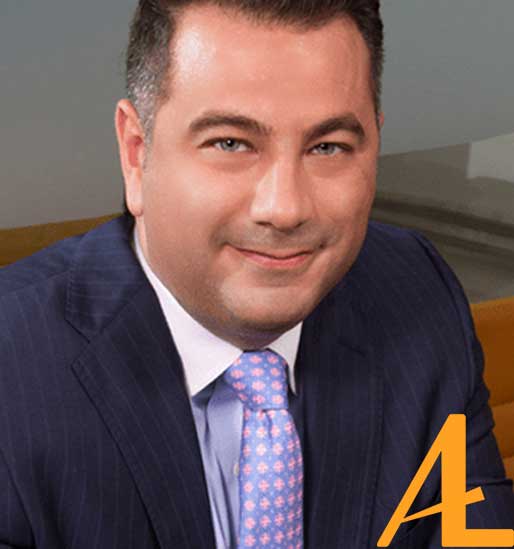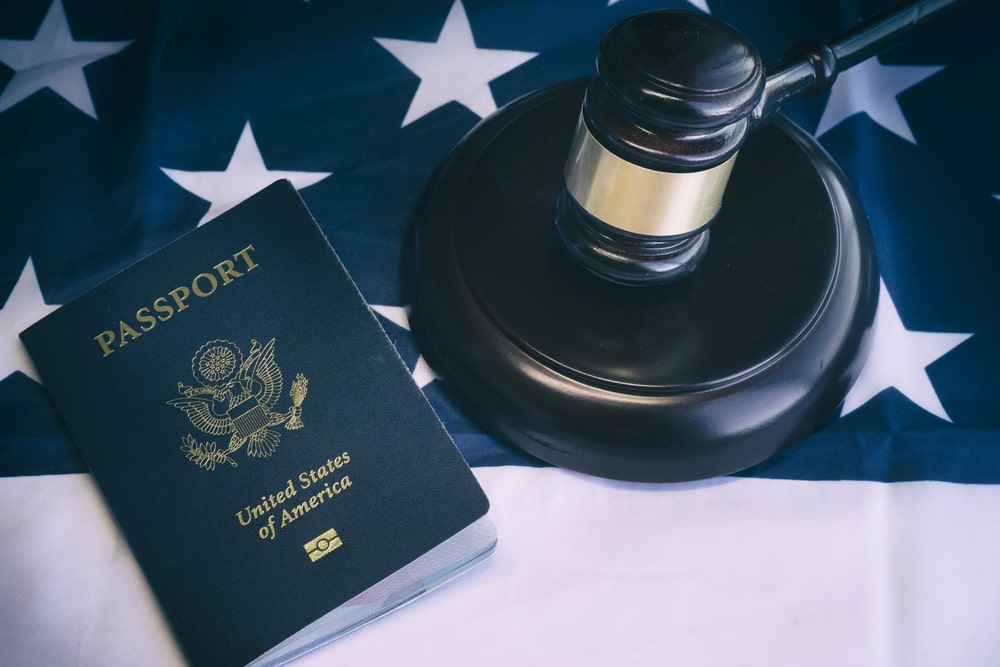Florida Immigration Attorney
Visas and Deporation
At the Andres Lopez Law Firm, our attorney can guide you through the immigration process. Resolving your immigration case can be the first step in your pursuit of a new beginning in the United States. Understanding the immigration laws, the application process and immigration procedures can be overwhelming and difficult. Therefore, hiring the right immigration attorney is the most important decision you will make. At the Andres Lopez Law Firm, we take the time to explain the process, assist our clients with gathering documents needed to submit to (USCIS), and provide the guidance you need to move your case forward.
The Andres Lopez Law Firm, PA is committed to accepting client cases that we strongly believe in, cases we can passionately advocate in every aspect. We feel it is vital to proceed in each case with the purpose of achieving our client’s goals. Honest communication with our clients in every aspect of the case is an essential requirement.
The Andres Lopez Law Firm, PA specializes in all types of immigration cases. We are committed to fighting for you and your family to ensure the best possible outcome, whether it be an Adjustment of Status, deportation proceedings, removal orders, naturalization, U Visa, Vawa petition, Removal of Conditions, waivers (I-601a, I-212); Bond Representation for those in ICE detention; Asylum/Withholding/CAT; Cancellation of Removal and Representation at Immigration Court.
We help immigration clients with the following cases:
Asylum: Many people come to the United States seeking protection because they have suffered persecution or fear that they will be harmed if they return to their home country. Asylum is a form of protection our government may grant to someone fleeing their country because they fear they will be harmed based on their race, religion, nationality, political opinion, or membership in a particular social group. This area of immigration law is very complicated but is essential to those fleeing their countries in search of safety.
At Andres Lopez Law Firm, we help people and families who have been harmed or fear harm from their government, people, organizations or crime, people who are facing removal from the U.S., or people who are seeking other humanitarian benefits.
Deportation removal defense: Our firm provides professional, effective representation for individuals facing deportation. Usually, anyone on a visa or who is not a U.S. citizen can be deported and sent back to their country of origin if they have been convicted of a crime or otherwise in violation of the terms of their residence or stay in the United States.
Deportation is serious. If you have been ordered to be removed from the U.S. or are currently in removal proceedings, The Andres Lopez Law Firm, PA is here to help. Our attorney is licensed to practice before the Executive Office of Immigration Review in all 50 states. Additionally, we provide services for the following:
- Bond representation for those in ICE detention
- Asylum/withholding/CAT
- Cancellation of Removal
- Representation of at Court Hearings, including Master Calendar and Individual Hearings
- Motion to Reopen and Motion to Stay of Removal
Family-Based Immigration Solutions: Our firm is committed to keeping families together through our knowledge of U.S. immigration law. We can assist you with the following family immigration matters:
- Spouse/Parent/Child/Sibling Adjustment of Status (I-130-Petition for Alien and Consular process outside the U.S.)
- Waivers (illegal entry, misrepresentation, fraud, criminal convictions)
- K-1 Fiancé Visas
Non-Immigrant visas: When an individual wants to travel to the United States for vacation, medical treatment and/or other temporary short visits, typically they can apply for a B-1, B-2 or another visa at the local U.S. consulate in their country of origin.
Citizenship and naturalization: The naturalization process is when a person who has a temporary legal residency or permanent legal residency can seek to become a U.S. citizen. Becoming a U.S. citizen is a dream for most immigrants. The path to citizenship, however, is riddled with pitfalls. We have experience counseling clients through the complexity of U.S. nationality laws.
Adjustment of immigration status: Adjustment of status is the process that you use to apply for lawful permanent resident status (also known as applying for a green card) when you are present in the United States. This means that you may get a green card without having to return to your home country to complete visa processing. The Andres Lopez Law Firm, PA can effectively help you complete this complicated process.
U visa, T visa and VAWA: Our firm is committed to helping all those who are in need.
- U visa: Non-immigrant visa for victims of crimes who have suffered substantial mental of physical abuse while in the U.S. and who have or are willing to assist law enforcement in the investigation or prosecution of the crime
- T visa: Allows certain victims of human trafficking and immediate family members to remain and work temporally in the U.S. if they report the crime to law enforcement and agree to help in the investigation and prosecution of the crime against them.
- VAWA: Under the federal Violence Against Women Act, any male of female may be eligible to receive a green card of you are victim of battery or extreme cruelty committed by a US citizen spouse or former spouse, US citizen son or daughter, a lawful permanent resident (LPR) spouses or former spouse, or an LPR parent.
7 Important Steps In The Immigration Process
Starting the family immigration process can be an important and sometimes emotional step. Whether you’re looking to bring a spouse, child, or parent to the United States, understanding the path ahead helps avoid delays. Each stage matters, and even small mistakes can lead to setbacks. At The Andres Lopez Law Firm, we know how valuable your time and peace of mind are, so we’ve broken down this process into clear, manageable steps.
We often work with individuals and families in Coral Springs who want to reunite with loved ones through legal immigration channels. If you’re considering petitioning for a relative, this breakdown offers a helpful overview of what lies ahead.
Determine Family Relationship Eligibility
First, we need to confirm the type of relationship you have with the person you want to sponsor. U.S. citizens can petition for immediate relatives such as spouses, unmarried children under 21, and parents. Lawful permanent residents may sponsor spouses and unmarried children. Each relationship category has different visa availability and timelines, so confirming eligibility is the foundation for everything that follows.
File Immigration Petition With USCIS
Once eligibility is confirmed, we submit Form I-130 (Petition for Alien Relative) to U.S. Citizenship and Immigration Services. This document provides proof of the qualifying relationship. Supporting evidence usually includes birth certificates, marriage records, and sometimes sworn affidavits. Getting this right the first time avoids delays or requests for additional documents.
Wait For Petition Approval And Visa Availability
After the petition is submitted, USCIS reviews it for accuracy and completeness. For immediate relatives of U.S. citizens, there’s no wait for a visa number. However, other categories are subject to visa limits, and processing may take longer. Keeping track of the Visa Bulletin helps predict timelines. We make sure clients understand what to expect at this stage.
Prepare For Consular Processing Or Adjustment
When a visa becomes available, your family member either attends an interview abroad at a U.S. consulate or adjusts their status within the United States, depending on where they are living. The decision depends on their current immigration status and location. Each option has its own procedures and documents to submit, including police records, medical exams, and Form DS-260 or I-485.
Submit Financial Support Documentation
All petitioners must file Form I-864 (Affidavit of Support), showing they meet income requirements to support the immigrating relative. This financial document protects the government from future dependency claims. Tax returns, pay stubs, and employment letters are common supporting materials. This is a common area for confusion, so we help clients prepare ahead of time.
Attend Visa Interview Or USCIS Interview
If your relative is abroad, they will be scheduled for a visa interview at a U.S. consulate. If they’re adjusting status in the U.S., they will be interviewed by a USCIS officer. In either case, the reviewing officer will confirm the relationship and review all the submitted documents. Our role is to help clients prepare thoroughly so they feel confident on the day of the interview.
Receive Visa Or Green Card Approval
After a successful interview and review, your family member will either receive an immigrant visa to enter the U.S. or an approved green card if already in the country. This final step may include follow-up instructions or conditions, especially if the relative’s green card is conditional due to a recent marriage.
Each part of this process builds on the previous one. Missing a document or misunderstanding a requirement can mean delays or denials. That’s why working with our knowledgeable Coral Springs, FL alien relative and family of U.S. Citizens immigration lawyer can make a meaningful difference.
At The Andres Lopez Law Firm, we guide families every step of the way, helping bring loved ones together. If you’re ready to begin your immigration journey or have questions about any part of the process, reach out to us today. We’re here to help you move forward with clarity and confidence.
Our experienced Coral Springs, FL family petitions I-130 lawyer helps families stay together through reliable and effective immigration support. For many, filing a family-based immigration petition is one of the first steps toward building a life together in the United States. The I-130 petition is a central part of that process, helping U.S. citizens and lawful permanent residents sponsor certain relatives for permanent residence. As a Coral Springs, FL family petitions I-130 immigration lawyer, we understand the emotional importance and legal requirements involved in each case, and we work to guide our clients every step of the way. Contact The Andres Lopez Law Firm today to schedule a consultation.
Family Petitions I-130 Immigration Lawyer Coral Springs, FL
The I-130 petition, also known as the Petition for Alien Relative, is filed with the U.S. Citizenship and Immigration Services (USCIS). Its purpose is to establish a qualifying family relationship between the petitioner and the intended beneficiary. This form is most commonly used by U.S. citizens or green card holders who wish to sponsor spouses, children, parents, or siblings for lawful permanent residency. Approval of the I-130 petition does not grant a green card, but it is a necessary foundation for further immigration steps, including adjustment of status or consular processing. Our Coral Springs family petitions I-130 attorney will help you craft a strong petition for you and your family. A properly completed I-130 petition must include proof of the familial relationship and supporting documents to avoid delays or denials.
Our Coral Springs family petitions I-130 immigration attorney knows that these cases are extremely important for our clients and their family, and we work hard to help you achieve your goals in an efficient and timely manner. Through every step of your case, our attorney will ensure that you are informed as we assist you with the petition and all related paperwork and interviews.
Why Experience Matters In Family Petition I-130 Cases
Having a knowledgeable attorney by your side during the I-130 petition process can make a difference in the outcome. The legal requirements are precise, and any mistakes or missing details can lead to rejection or prolonged delays. Our experienced Florida family petitions I-130 lawyer can help identify the correct category, prepare documentation, and respond to any requests for evidence from USCIS. We’ve seen how difficult and time-consuming the process can be when clients first attempt it on their own. By working with our team, families gain a reliable partner who can help them avoid setbacks and move forward with confidence.
- Attorney Andres Lopez has over 15 years of legal experience, including 14 years assisting clients at the Andres Lopez Law Firm
- Attorney Lopez is a dedicated member of the legal community, as a member of The Florida Bar, the Broward County Bar Association, the Broward County Hispanic Bar Association, the Maryland Bar Association, and the Florida Justice Association
We are committed to helping families through the I-130 petition process with clear guidance and dependable service. If you’re looking to petition for a relative, our Florida family petitions I-130 immigration lawyer is ready to assist. Contact The Andres Lopez Law Firm today to learn how we can help you bring your family together through lawful immigration pathways.
Immigration Attorney FAQs
How Do I Get A Green Card?
A “green card” establishes someone as a lawful permanent resident of the U.S. This status can be achieved in a few different ways. Some people may obtain a green card through a K-1 marriage visa, while others may apply for permanent residency through other visas, such as a work visa. Some visas have a path to a green card, but others do not. An immigration attorney can let you know which visas can lead to a green card.
The path to lawful permanent residency begins with a green card application. Then you’ll have to submit certain documents, attend a biometrics appointment, and go through at least one interview with an immigration official.
How Do I Sponsor A Family Member For Immigration?
Which family-based visa your family member is eligible for (and often, whether or not they’ll have to join a waiting list) depends on their relationship to you. Your first step to sponsor a family member for a U.S. visa is to submit a United States Citizenship and Immigration Services (USCIS) Form I-130. You’ll need one form for each family member you wish to sponsor.
If your family member is already in the U.S., you’ll apply for a Change of Status. If they are not, they will go through Consular processing. Once the application and supporting documents are processed and fees paid, your family member(s) will have an immigration interview.
What Should I Do If My Visa Application Is Denied?
First, read the denial letter carefully. Some visas are denied because the application wasn’t filled out correctly. Or the applicant didn’t submit the right supporting documentation. Once you know the reason, you can address it. Usually, you can reapply for a visa, although unless you had a 221(g) refusal, you’ll have to submit an entirely new application and pay the application fee again.
Your visa denial letter should indicate which section of U.S. immigration law covers the reason for the denial. The reasons can vary, and the laws are complex; an experienced immigration attorney can review your denial reason and provide advice that applies to your situation.
How Do I Apply For DACA Status?
A Deferred Action for Childhood Arrivals (DACA) may be available for persons who came to the U.S. as children and meet other qualifications. Start by filling out Form I-821D, Consideration of Deferred Action for Childhood Arrivals, and submitting proof of identity, proof of immigration status, and proof that you came to the U.S. before your 16th birthday. The USCIS requires several other forms of proof that you lived in the U.S., such as proof of presence in the U.S. on June 15, 2012, and proof you continuously resided in the U.S. since June 15, 2007.
What Financial Support Proof Do I Need When Sponsoring A Family Member?
All sponsors must submit their individual federal income tax returns, including W-2s for the most recent tax year. If you were not required to file taxes, you must submit proof explaining why you weren’t.
There are other requirements, too, depending on your status and the status of the family member you’re sponsoring. You may need proof of employment and residency in the U.S., as well as documentation of your assets and documentation of any loans or leases on those assets.
Our office is available 24/7 to discuss your immigration needs. Call us at 754-764-6775.

Trial Attorney
Attorney Andres Lopez has over a decade of trial experience. In that time, his work and track record of success has earned him a reputation for being a top trial attorney in South Florida.
Born in La Paz, Bolivia, Andres Lopez and his family moved to Washington, D.C. when he was a child.
Prior to attending law school, Andres Lopez tirelessly worked to give a voice to the people by serving in the White House, the Maryland Governor’s Office and managing the campaign of the first Latino to be elected to public office in Maryland.
Devoted to the legal community, Mr. Lopez serves as a member of The Florida Bar, the Broward County Bar Association, the Broward County Hispanic Bar Association, the Maryland Bar Association and the Florida Justice Association.





